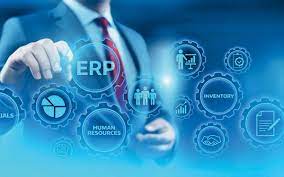There are several construction ERP software implementation motivations for businesses. While some companies may be looking to improve their employment procedures, others may focus on streamlining their order-to-cash operations.
Why a construction company needs a ERP system?
ERP can be especially valuable in the construction industry because it helps companies manage the complex and varied processes involved in building projects.
One key benefit of ERP for construction companies is that it helps them track and manage their resources. This includes materials, equipment, labour, and financial resources. By centralizing and automating these processes, ERP can help construction companies reduce waste, improve efficiency, and better allocate their resources.
Another benefit of ERP for construction companies is that it helps them manage and track projects from start to finish. This includes everything from project planning and design to execution and completion. ERP can help construction companies keep track of deadlines, budgets, and deliverables, and it can also help them identify and address potential problems before they become significant issues.
ERP is valuable for construction companies because it helps them manage and optimize their resources, track and manage projects, and improve communication and collaboration. By implementing ERP, construction companies can improve efficiency, reduce costs, and increase competitiveness.
ERP providers have responded to these specific requirements by creating comprehensive solutions. Here are five instances of how a cutting-edge ERP system may enhance core business operations:
- Manage Accounts, Payable, and Receivable
A company often uses an ERP system to exert more authority over its finances. A unified ERP system may improve the efficiency of all your company’s financial operations. With its state-of-the-art, integrated interface, your business may boost efficiency and openness in its financial management.
- Support for Customers
Today, ERP for construction company features may be found in many enterprise resource planning systems. Others are easy to incorporate into existing infrastructures. If your operation is categorized, you will lose valuable data insights. Gaining deeper insights from your data may enhance your ability to serve your customers. The incoming customer service was automated by the integrated ERP system that one of our process manufacturing customers adopted, freeing up representatives’ time for outbound calls.
- Management of the Supply Chain
The holy grail of material, inventory, assembly and line personnel-dealing manufacturing businesses is the successful refinement of the supply chain management function. Globalization and domestic production benefit from enterprise resource planning (ERP) software. A supply chain management-savvy ERP system may be helpful when dealing with factors like currency fluctuations, import/export regulations, and the need to comply with local manufacturing legislation.
- Order action
An ERP system’s order processing module is built to facilitate the administration of order taking, credit checking, shipping, sales analysis, and reporting. Inventory, shipping, and other fulfilment duties may be managed with the help of Eresource ERP and similar services. Many of these systems also have modules with the Internet of Things (IoT) functionality and customer interface modules that may be integrated with your company’s website.
- Human Resources
Any business, no matter its size, may benefit significantly from an ERP system that includes a human resources module. Not every business requires highly advanced features, but those with access to a few service providers.
- Management of Projects
ERP systems may aid in smooth operations and scalability when activities like invoicing, expenditure management, and human capital management must be accounted for and included in the overall balance sheet.
Conclusion
Even though enterprise resource planning (ERP) software may automate a wide variety of functional areas, you will reap more business advantages if you optimize your functional areas before purchasing your ERP software. Workshops for eliciting requirements might shed light on the inefficiencies in your business’s procedures, and what steps in the process might need some tweaking can be identified from the results.
Business process reengineering is a technique for improving the fit between your ERP software and your company’s overall objectives. If you streamline your operations first, your ERP deployment will be seen by upper management as less of an IT project and more of a strategic endeavour.


